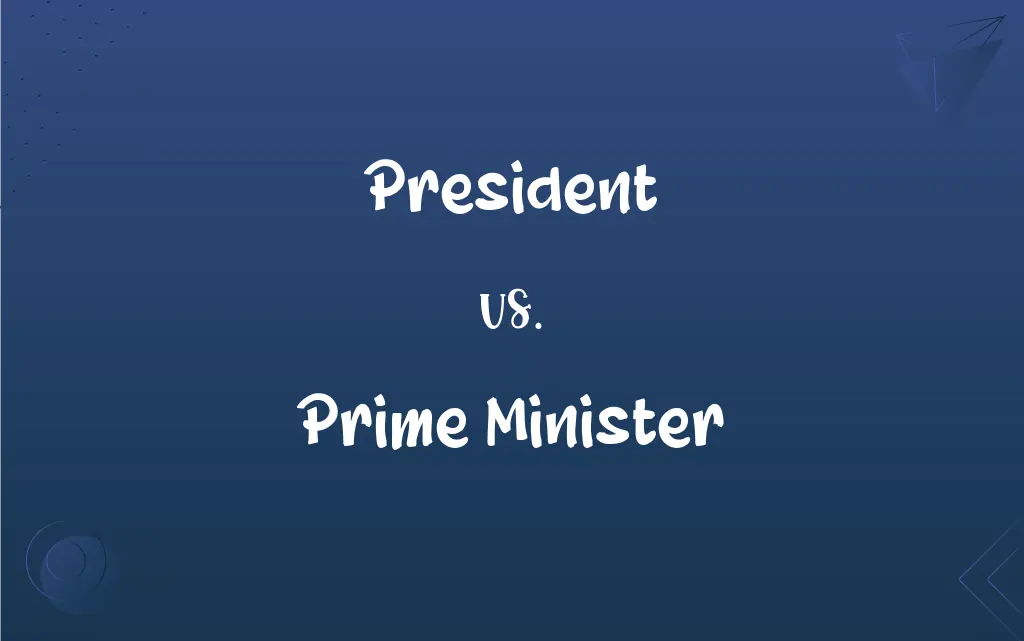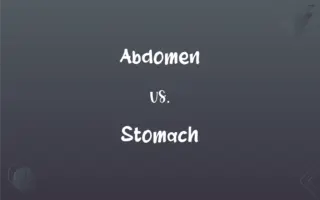President vs. Prime Minister: What's the Difference?
Edited by Aimie Carlson || By Harlon Moss || Updated on October 14, 2023
A president is typically the head of state, often with executive powers; a prime minister is the head of government, responsible for running the country's administration.

Key Differences
A president is usually an elected or appointed official who represents the unity and legitimacy of the state. In contrast, a prime minister is typically the leader of the majority party in parliament and heads the government's administrative functions.
Many nations have both a president and a prime minister, where the president's role might be largely ceremonial, while the prime minister's role is more about day-to-day governance. In such systems, the prime minister often holds more actual power.
In some countries, the president is both the head of state and the head of government, combining ceremonial roles with executive powers. Here, there might be no prime minister at all.
Conversely, in other nations, the prime minister is the chief executive, and the president's role is minimal or purely symbolic. Such systems might see the prime minister taking lead in both domestic and foreign affairs.
Essentially, while the exact powers and responsibilities can vary greatly by country, a president symbolizes the unity of the state, and a prime minister generally runs the government.
ADVERTISEMENT
Comparison Chart
Primary Role
Often the head of state.
Typically the head of government.
Source of Power
Directly elected or appointed.
Leader of the majority party in parliament or appointed by the parliament/president.
Duration of Term
Fixed term (e.g., 4 years in the U.S.).
Can be ousted by a vote of no confidence or end of parliamentary term.
Scope of Power
Can vary - ceremonial to executive powers depending on the nation.
Administrative and policy-making. Runs the day-to-day operations of the government.
Typical Responsibilities
Foreign policy, defense, and sometimes domestic policy.
Domestic policy, administration, and sometimes foreign affairs.
ADVERTISEMENT
President and Prime Minister Definitions
President
A leader or head of a business, organization, or institution.
The president of the university announced a new scholarship program.
Prime Minister
A commonly used term in literature and media to describe a leader navigating political intrigue.
In the novel, the prime minister is portrayed as a cunning and strategic leader.
President
The elected head of a republican state.
The president delivered a powerful speech about unity to the nation.
Prime Minister
Often the leader of the majority party and the chief executive of the government.
The prime minister faces criticism for the government's handling of the crisis.
President
A presiding officer in certain other organizations or bodies.
The president of the club called the meeting to order.
Prime Minister
A chief ambassador, especially in diplomacy or in the administration of colonies.
Historically, a prime minister might oversee colonial matters on behalf of the crown.
President
A figure or representation often used to symbolize a particular nation or community.
Cartoonists often exaggerate features of the president for satirical effect.
Prime Minister
The first among equals in the cabinet of ministers.
Though equal in status, the other ministers typically defer to the prime minister.
President
The highest executive officer in certain other countries, as China.
The president of China attended the international summit.
Prime Minister
The principal minister and head of government in parliamentary systems.
The prime minister proposed new legislation to parliament.
President
One appointed or elected to preside over an organized body of people, such as an assembly or meeting.
President
The chief executive of a republic.
FAQs
Is a president always the head of state?
In most contexts, yes, but roles can vary depending on a country's specific governmental structure.
Is a president always elected by popular vote?
Not always; the method of selection depends on a country's specific political system.
How is a prime minister chosen?
Typically, a prime minister is the leader of the majority party in a parliament and is appointed by the head of state.
Is the prime minister's role the same in all countries?
No, the role and powers of a prime minister can vary significantly depending on the country’s constitutional framework.
Can a president be impeached?
Yes, in countries like the USA, presidents can be impeached for high crimes and misdemeanors.
Can a president or prime minister be re-elected?
This varies by country. Some nations allow multiple terms, while others impose strict term limits.
Can a prime minister be removed from office?
Yes, methods of removal can include a vote of no confidence, resignation, or dismissal by the head of state.
What is the primary role of a president?
To serve as the head of state and government, overseeing the administration and representing the country.
Can anyone become a president?
Eligibility varies by country, often requiring citizenship, a minimum age, and other qualifications.
Can the prime minister dissolve parliament?
In some parliamentary systems, yes. The prime minister may have the power to request the dissolution of parliament, although the formal power might lie with a monarch or president.
Does the president have a role in legislating laws?
This varies by country. In the USA, for example, the president can veto legislation but does not propose laws to Congress.
Are presidents always involved in international relations?
Generally, yes. Presidents often play a key role in foreign affairs and represent their nation internationally.
How long can a prime minister serve?
This depends on national laws and party rules. Some countries impose term limits, while others do not.
What is the residence of the U.S. President?
The White House, located in Washington D.C.
Is a prime minister more powerful than a president?
It depends on the country's governmental structure; in some nations, prime ministers have more executive powers, while in others, presidents do.
Do all countries have a prime minister?
No, some countries have a president or another figure as the head of government instead.
Can a president also act as a prime minister?
In some countries, yes. The president may serve both as the head of state and head of government, combining roles often assigned to presidents and prime ministers.
What is the prime minister’s role in elections?
The prime minister often leads their political party in electoral campaigns and may set legislative agendas that form the basis of the party's platform.
Is the term “prime minister” universal?
While widely used, some nations may use different titles for the position, like "Chancellor" in Germany.
Who becomes president or prime minister if they resign or are unable to serve?
Succession typically follows rules outlined in a country’s constitution or legal framework, often involving vice presidents, deputy prime ministers, or other high-ranking officials stepping in.
About Author
Written by
Harlon MossHarlon is a seasoned quality moderator and accomplished content writer for Difference Wiki. An alumnus of the prestigious University of California, he earned his degree in Computer Science. Leveraging his academic background, Harlon brings a meticulous and informed perspective to his work, ensuring content accuracy and excellence.
Edited by
Aimie CarlsonAimie Carlson, holding a master's degree in English literature, is a fervent English language enthusiast. She lends her writing talents to Difference Wiki, a prominent website that specializes in comparisons, offering readers insightful analyses that both captivate and inform.































































